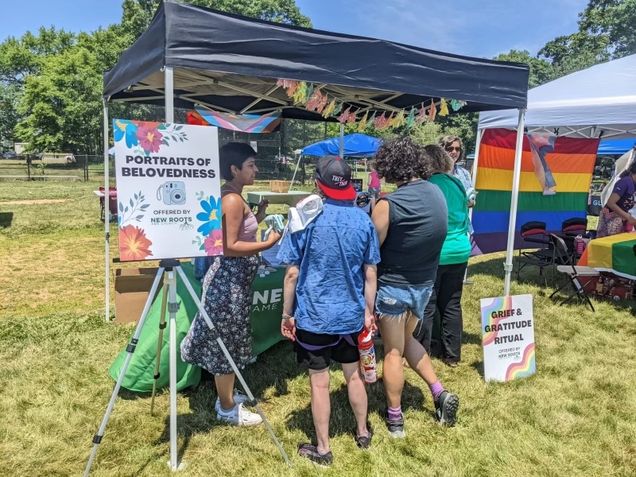KIP Student Feature – Anne Joseph
 Anne Joseph (CAS’25) is majoring in Sociology and spent the summer working with New Roots AME Church in Dorchester, MA. In this feature, Anne shares different ways to participate in advocacy work and how important building and maintaining community is to social justice.
Anne Joseph (CAS’25) is majoring in Sociology and spent the summer working with New Roots AME Church in Dorchester, MA. In this feature, Anne shares different ways to participate in advocacy work and how important building and maintaining community is to social justice.
The photo below shows Anne working a booth at a community event this summer where they were offering “Portraits of Belovedness” to guests at the event.
Q&A with Anne Joseph
Could you give us a brief description of the organization you are interning with and what your primary responsibilities are during this internship?
This summer, I worked with New Roots AME Church which is an inclusive congregation that promotes community building, sustainable spiritual practice, and the pursuit of justice. Based in Dorchester, MA, New Roots has fostered a strong connection with the Boston community and currently focuses its advocacy work on the issues of liberation and environmental justice. Throughout my internship, I worked on several projects that ranged from tabling at the Trans Resistance March in Franklin Park to researching and compiling data on advocacy organizations to support within Dorchester. During each weekly service, I provided online support and helped facilitate various events, including the community’s gathering, to discern their identity as a Boston-based organization. Throughout the month of August, I aided in organizing a program entitled New Roots in Nature during which services were held at different places that fostered connections with the land such as Carson Beach and the Nightingale Community Garden.
How did you find out about this internship, and could you tell us more about the application process?
My connection with New Roots actually started before I got to BU since I did an independent project in my senior year of high school, and I worked with my current mentor throughout that experience. My project centered on creating a comprehensive action guide for my parish’s Racial Justice Ministry that compiled resources on advocacy groups, workshops, and equity training that neighboring religious institutions have worked with, and my mentor guided me on how to approach the project in a sustainable way. I really enjoyed being a part of the New Roots community, so when I found out about KIP, I knew that rejoining New Roots would be a great opportunity to become more involved in their own advocacy work. I had reached out to my previous mentor to ask whether an intern position was available this summer, and we met to discuss the details of what my internship would look like. After finalizing those plans, the KIP application process was very straightforward. Throughout the application process, I could reach out to Rick or Dr. Preston regarding any questions I had, and the timeline of the process was accessible to work with as well. I would highly encourage anyone interested in pursuing a project centering on any form of justice work to apply to this program (KIP) and use these resources available to the Kilachand community!
How did your internship fulfill the goals of social justice?
At the center of social justice work are the principles of equity, resource distribution, and community care. An aspect of what I have learned throughout this internship is that no matter the breadth of each project I have engaged with, any effort can help in the larger movement toward an equitable society. This summer, I had the opportunity to help organize our participation in the March for Our Lives against gun violence, and while supporting a campaign much larger than myself, I reflected on how each act can create an impact, regardless of its extent. Collecting data on the organizations that support food justice, wealth distribution, housing justice, etc. facilitates New Roots’ process of engaging with groups that share their values and goals as they pursue justice moving forward. No matter the form that a project takes, each one has significance in the broader movement toward justice, and that experience has been incredibly rewarding throughout this internship.
Has the work you have done this summer changed how you think about social justice?
One of the core values of New Roots is working towards liberation and this pursuit of justice can be achieved through different means. Creating sustainable systems that promote inclusion and equity is an essential part of how New Roots believes we must move forward as a society, and that end goal has many elements included within it. Part of what New Roots has shown me about how to pursue social justice and the values of liberation is that the factors that support the struggle should center on both action and community. Participating in protests and contacting legislators can be as valid a form of activism as gathering to support one another and caring for the community. This internship has deepened my understanding of justice work as a balance between many different aspects of what advocacy can look like, yet at the center of this mission is community care. Being able to expand on what it means to form and maintain connections with others and find common ground has been a valuable experience that I will continue to practice moving forward.
How has the Kilachand coursework helped prepare you for the work you are doing during your internship?
In Studio I, we had the opportunity to visit the Arboretum, and during that experience, I practiced being conscious of my surroundings and focusing on how each guided meditation could bring me closer to the nature around me. The Arboretum experience as well as the written exercise was a precursor to the level of reflection I could do as a member of the New Roots community. An aspect of New Roots’ services that I have truly come to appreciate is the emphasis on connecting with nature and understanding what we can learn from how nature thrives. Each service usually includes a meditation that invites participants to engage with an element of nature, like gazing out the window and taking note of what you see. When I was tasked with helping to lead service, having a space to reflect with nature in Studio I helped in my understanding of this practice and how to facilitate that experience for others.
Learn more about the Kilachand Internship Program here.
